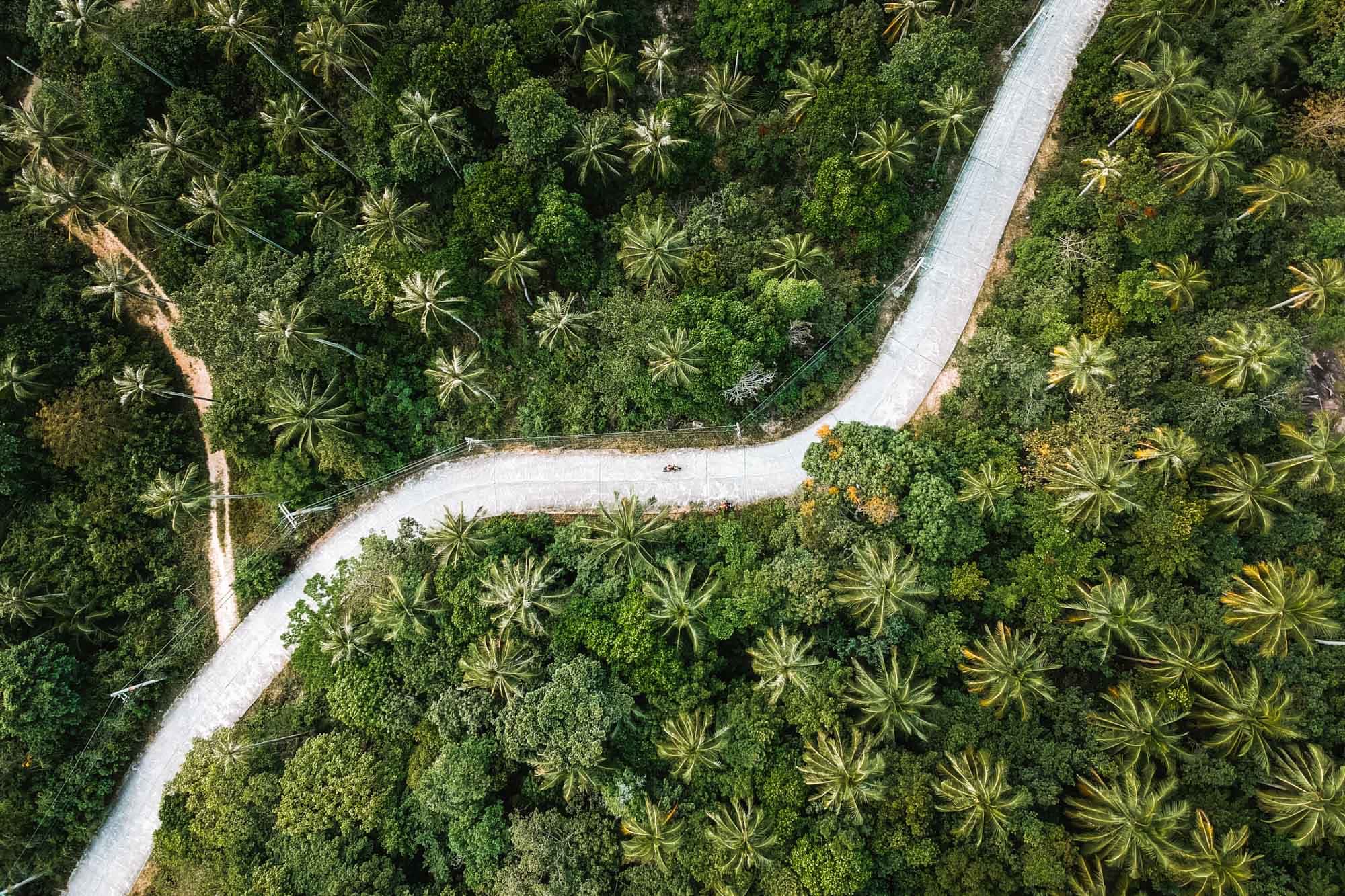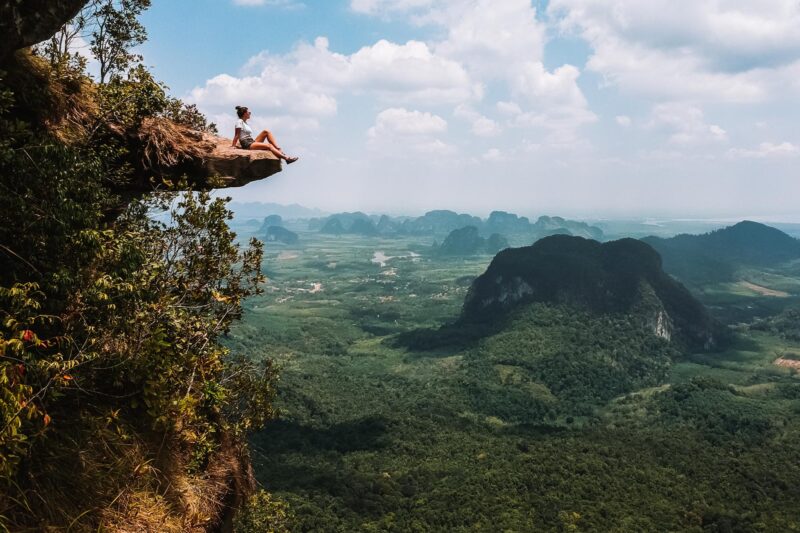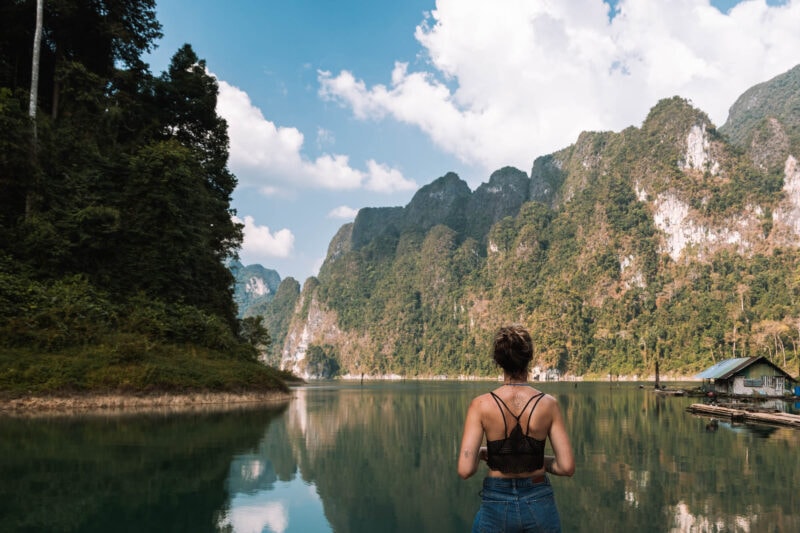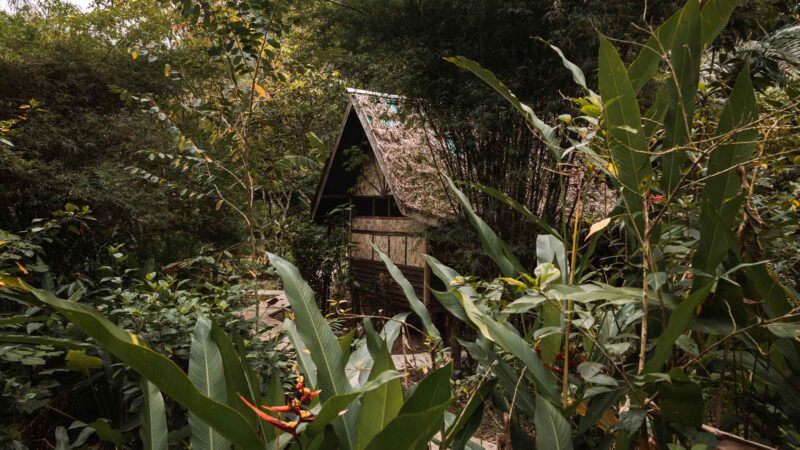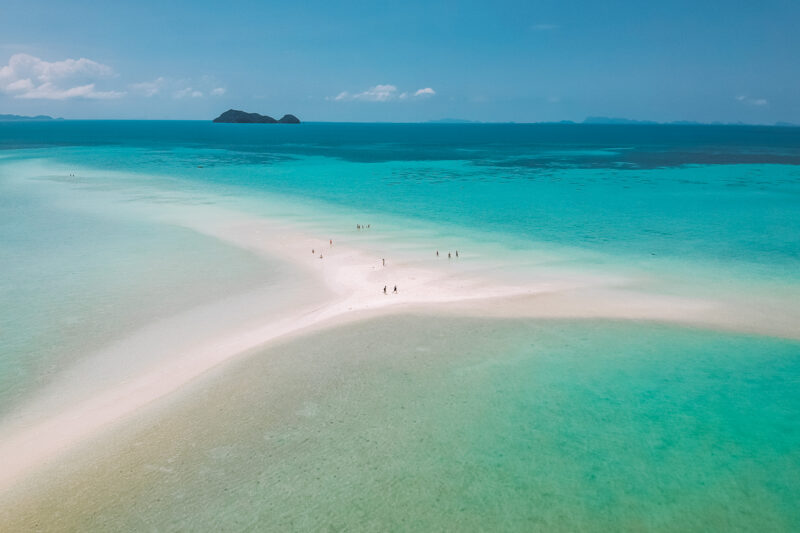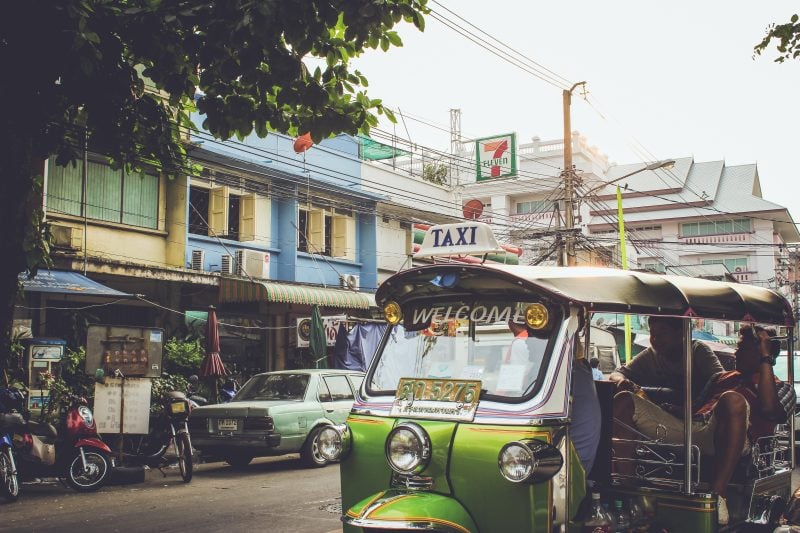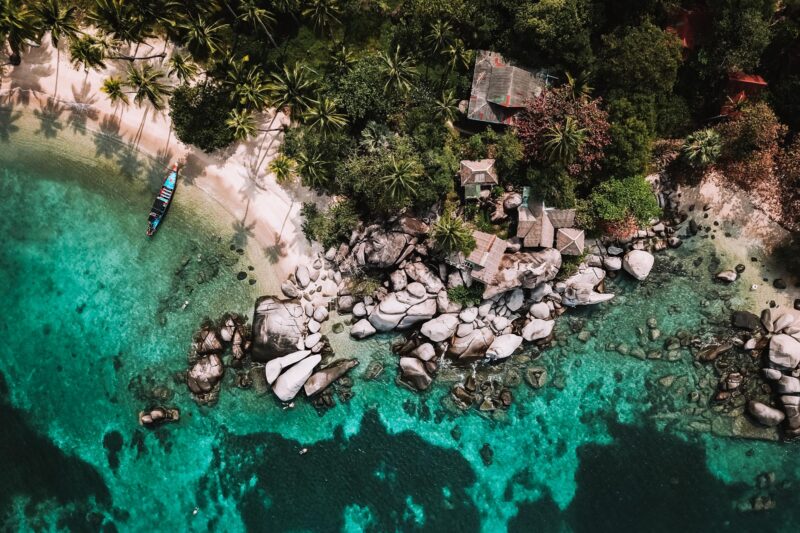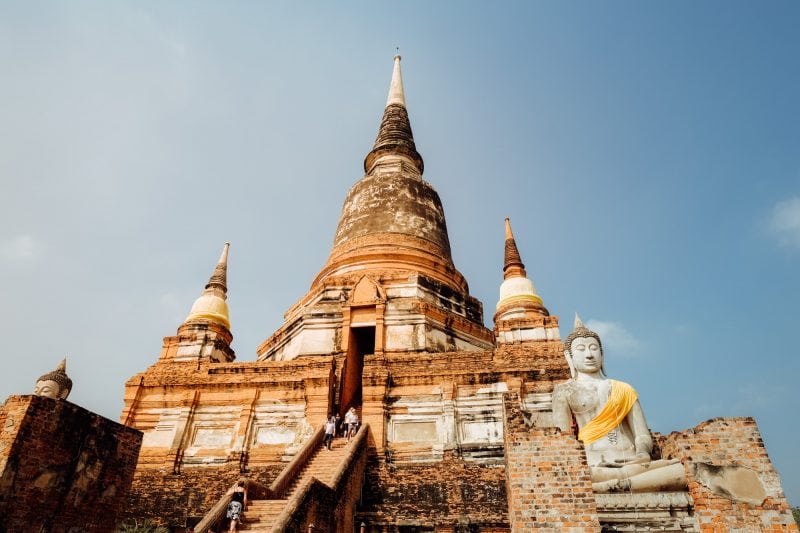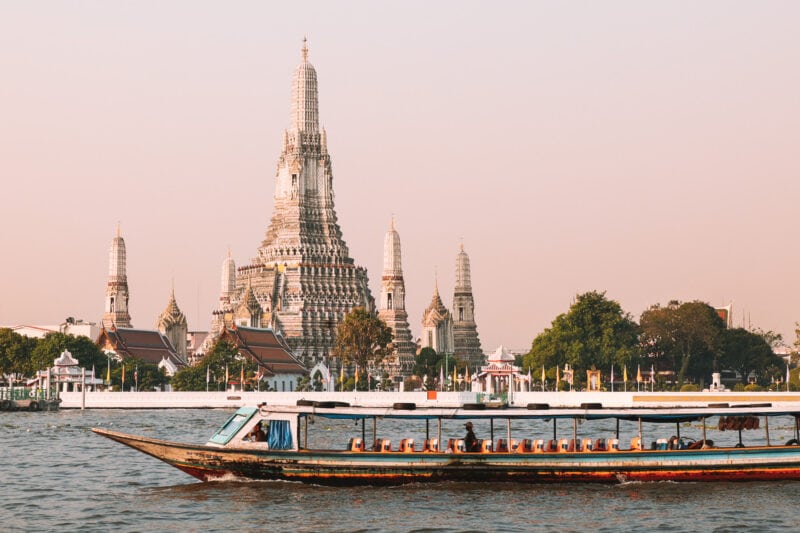Hundreds of paradise islands, jungle, interesting culture, friendly people, fun parties, and delicious food; Thailand has everything you need for a fantastic trip. Traveling through Thailand is very easy, but there are a few things you should know before getting on the plane. With these 12 practical tips, you’ll get even more out of your trip, save money, and be well-prepared for your journey to Thailand!

#1 This is the best time to travel to Thailand
Thailand has a tropical climate, which means it’s pleasantly warm here all year round. Thailand roughly has two seasons: the dry season and the rainy season. The dry season lasts from November to May, while the rainy season lasts from June to October.
The rainy season in Thailand
Don’t be immediately put off if you’re planning to travel to Thailand during the rainy season because it’s actually a good time to visit. In the rainy season, there is more rain, but it usually comes in short, heavy showers. The chance of continuous rain for days on end is small, although there’s always a possibility of some bad luck. Typically, showers occur in the afternoon, evening, or night. The months of September and October receive the most rain in Thailand, so if you prefer a sunny vacation, it’s best to choose a different time to travel to Thailand. One major advantage of traveling during the rainy season is that it’s much quieter than the dry season. Hostel and hotel prices are more affordable, especially in September and October. Additionally, the landscape is lush green, and the rice fields are beautiful.
The dry season in Thailand
The dry season is also the peak season in Thailand. November to February is the cooler dry season. The temperatures are pleasant, the landscape is green, and the chances of clear blue skies are high. Due to the favorable weather conditions, these months are also much busier. March to May are still part of the dry season, but temperatures are considerably higher. The landscape is drier, and the rice fields are not green but brown. During these months, farmers burn the rice plants after harvest, resulting in smog in many areas.
#2 Thailand is easy to explore on your own
Organizing a trip through Thailand without the help of a travel agency is very easy, even if you have little or no travel experience. Thailand is one of the safest countries in the world and is fully equipped for independent travelers. The cost of living is cheap, transportation is well-organized, and you can find restaurants and hotels on every street corner. This makes Thailand the perfect entry-level destination for a first long-distance trip without a travel agency. Check out our Thailand page and plan your trip yourself using our tips. This way, you’ll save a lot of money and have all the freedom!

#3 You must fill out a Thailand Digital Arrival Card before departure
As of May 2025, all travelers are required to complete a Thailand Digital Arrival Card (TDAC) within 72 hours before departure. You’ll need to provide your personal details, flight information, accommodation address in Thailand, and a health declaration. Once submitted, you’ll receive a confirmation via email, which you must show to immigration upon arrival. It’s highly recommended to complete this ahead of time, as airport Wi-Fi can be slow. There is no cost to submit the TDAC.
#4 Be aware of cultural differences
Thai culture is very different from the culture we are familiar with at home. What may be normal in your country can be considered truly not done in Thailand. It’s important to familiarize yourself with the culture in advance and be aware of the key differences. We’ve listed the three most important points for you, so you can avoid making common mistakes.
Don’t get angry – Thailand is known as the Land of Smiles and has a very laid-back culture. It’s highly unlikely that you’ll encounter anyone getting angry while you’re in Thailand. It’s also highly inappropriate to raise your voice, for example. If you find yourself in a disagreement with a taxi driver, for instance, you can express your opinion but always remain calm and respectful. Even when negotiating a price, a smile goes a long way and is more effective.
Head and feet – In Thailand, feet are considered unclean while the head is sacred. It’s considered very impolite to point the soles of your feet at someone. So never put your feet on the table, and when riding in a tuk-tuk, it’s extremely rude to sit with the soles of your feet facing the driver. Also, make sure not to sit with the soles of your feet facing Buddha in a temple. As the head is considered sacred, you should not touch someone else’s head. In the some parts of the world, for example, we often pat children on the head, but it’s better not to do that in Thailand.
No pointing – It’s also considered impolite to point at someone in Thailand. If you’re referring to someone, simply nod in their direction but never point at them.
#5 Tips for ATM withdrawals and payments in Thailand
In Thailand, cash is the primary method of payment in shops, taxis, and restaurants. So upon arrival and during your trip, you’ll need to withdraw cash from ATMs. The local currency is the Thai Baht, and ATMs are available throughout Thailand. Withdraw the maximum amount allowed because you’ll be charged a fixed fee per transaction by your bank. Withdrawing cash using your debit card is much cheaper than using your credit card. Before leaving for Thailand, make sure to enable worldwide usage on your debit card. At ATMs, you’ll receive the cash first and then your card.
When paying with cash, always double-check the amount printed on the banknotes. If you rely solely on color, you may make mistakes because the colors can be similar. We once gave a taxi driver 1000 baht instead of 100 baht simply because the colors looked alike.
#6 Renting a scooter in Thailand
Do you have experience riding a scooter? Renting a scooter in Thailand can be a great experience. It’s possible in every destination in Thailand except for Bangkok. A scooter gives you the freedom to go wherever you want, and you’re not dependent on taxis. Renting a scooter in Thailand is inexpensive, and since you won’t be spending money on taxi rides, there’s a good chance you’ll save money as well. Below are a few quick tips for renting and riding a scooter in Thailand.
- When renting a scooter, it’s wise to make a clear video of the scooter beforehand, capturing any existing damages. This way, you can avoid disputes when returning the scooter.
- Always wear a helmet in Thailand. It’s for your own safety as scooters leave you vulnerable. Thailand is among the top 10 countries with the highest number of traffic fatalities worldwide. Therefore, always ride cautiously and stay on the side of the road.
- In Thailand, scooters have a minimum engine size of 100cc. In the some parts of the world, this would require a motorcycle license, but in Thailand, scooters with fewer cc do not exist. Essentially, you’re renting a motorcycle rather than a scooter. Even without a motorcycle license, you can rent a scooter, but be aware that your travel insurance may not be valid without a motorcycle license. However, many people still do this in Thailand, but the choice is yours to make.
- Often, the rental company will ask for your passport as a deposit while you’re renting the scooter. Despite the rental company wanting assurance that you’ll return the scooter, never give them your passport. Instead, bring a few copies of your passport that you can provide to the rental company. Additionally, you’ll need to pay a security deposit.
- An international driving license is mandatory in Thailand. You can apply for one at an ANWB store before your trip to Thailand.
#7 Greet and Thank the Thai people in their own language
Thais are accustomed to travelers visiting their country. The people in Thailand still strongly adhere to their culture, and they appreciate it when travelers make an effort to adapt. In Thailand, they don’t shake hands; instead, it’s customary to greet each other with a Wai (placing your palms together). Additionally, they appreciate it when you greet and thank them in Thai. It may take some practice, but with these two words, you’ll earn much more respect.
Hello & Goodbye for men: Sa-Wa-Dee-Kap.
Hallo & Goodbye for women: Sa-Wa-Dee-Kaa.
Thank you for men: Kap-Kun-Kap.
Thank you for women: Kap-Kun-Kaa.
#8 Get a local SIM card
If you prefer to have internet access anywhere and anytime, consider getting a local SIM card in Thailand. You can purchase SIM cards at 7-Eleven stores, offering various packages and providers to choose from. Local SIM cards with data are affordable, and you’ll have good coverage almost everywhere in Thailand.

#9 Always dress appropriately in temples
With over 40,000 temples in Thailand, chances are you’ll be visiting several during your trip. Always ensure that you enter the temple without shoes and with your shoulders and knees covered. This guideline particularly applies to women, but it’s also appreciated when men dress modestly. If you’re not dressed appropriately, you can often rent a sarong at the temple entrance.
#10 Pre-booking Transportation in Thailand
Transportation in Thailand is well-organized. You can usually book a bus trip last minute at your hotel or hostel. However, for the train journey to and from Chiang Mai, it’s advisable to book in advance. If you prefer to have everything arranged beforehand, so you don’t have to worry about it during your trip, you can conveniently purchase your tickets online. The advantage of this is that you have the assurance of booking with a reputable bus company. A reliable website to book bus and train tickets is 12go.asia. Here, you can book buses, boats, trains, flights, and private taxis. The costs are usually similar to those of tour companies found on the street corners or in your hotel.
#11 Eating Street Food in Thailand
We often hear that people are a bit hesitant to eat street food in Thailand. There’s no need to worry; in fact, it’s highly recommended. Just make sure to choose a food stall that is busy and where the food is prepared fresh, so you know it hasn’t been sitting for a while. In many places like night markets, the food is excellent and fresh. You can try various delicious snacks from different stalls to create a satisfying meal. If you want to discover the most delicious Thai dishes, it’s fun to join this food tour in Bangkok during one of your first days in Thailand. You’ll learn all about Thai cuisine and get to taste 16 different delicacies!
Tip: To prevent food poisoning, it’s wise not to buy pre-cut fruit. Have it cut or peeled in front of you.
#12 Taxis are Cheaper Than Tuk-tuks in Bangkok
First and foremost, you should definitely take a ride in a tuk-tuk at least once when you’re in Bangkok. Always hail a moving tuk-tuk and avoid ones parked on the side of the road. This often results in a lower price. Negotiating the price is common in Thailand, as sometimes they may ask for outrageous prices. If you’ve already experienced a tuk-tuk ride before, it’s better to take a taxi that operates on a meter. You can save a lot of money this way, avoid inhaling exhaust fumes, and enjoy the comfort of air conditioning, which is especially refreshing in the hot Bangkok weather.
#13 Skip Phuket
Phuket is the largest and most well-known island in Thailand. We had heard mixed reviews about it and decided to give it a chance. Unfortunately, the island did not live up to our expectations. We spent five days there, and everything was significantly more expensive compared to other places in Thailand. Especially the songthaews (local shared taxis) on the island charge exorbitant prices. There isn’t a lot of remarkable things to do, and the mass tourism makes it a rather uninspiring place. Phuket is entirely geared towards tourism, and in most areas, you’ll see more tourists than locals. Therefore, it’s best to explore another island as Thailand has plenty of them to offer! Check out our travel itinerary through Thailand to discover which destinations are worth visiting.
